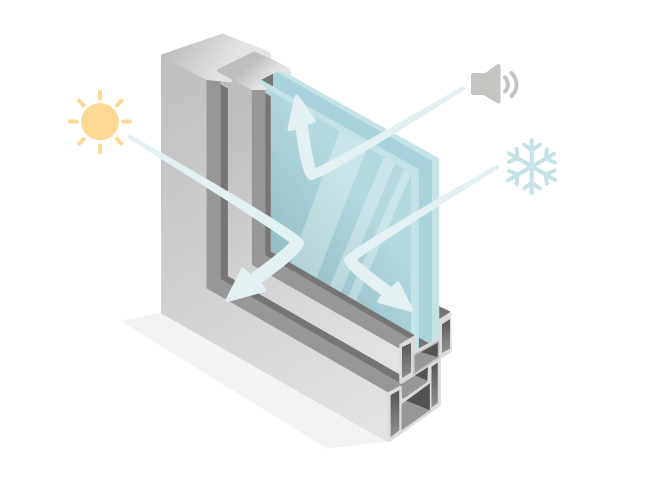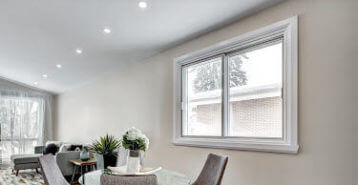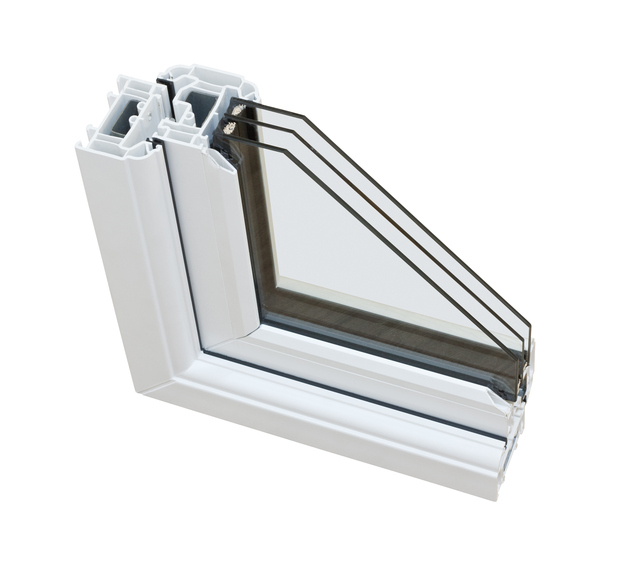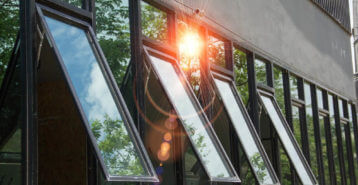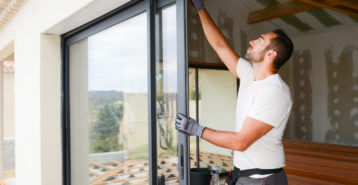What Are Insulated Windows?
In its most basic form, an insulated glass unit, or IGU, is composed of two (or more) glass panes separated by a spacer, with air or gas filling the space between each pane. This space provides insulation from outside elements by limiting or stopping transfer of air from windows in and out of your homes. This helps your home stay warmer in the winter and cooler in the summer.
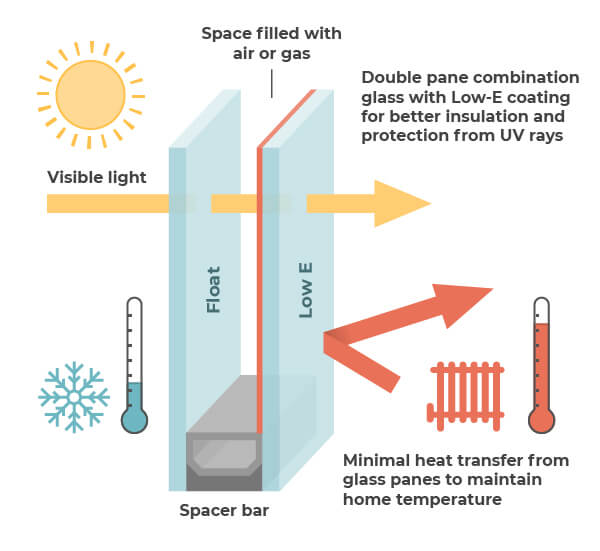
For increased insulation (and cost), a third, or even fourth, layer of glass can be installed. Regardless of the number of panes used, the core concept is the same. Insulated windows feature glass surfaces separated from each other and filled with air or gas.
Insulated windows can go a long way toward cutting household energy and utility costs, as well as adding to the aesthetic of your home. We’ll define different types of insulated windows and what insulated glass panels have to offer.
The Difference Between Gas and Air-Filled Windows
Whether you choose air or gas will impact your window replacement project cost, energy-efficiency, and longevity.
Air-Filled IGU
When filled with air, the seals that hold your window panes in place will have a longer lifespan compared to IGUs filled with gas. While this increased lifespan is minimal, it is something to consider if you’re looking for maximum longevity in your project. Air-filled IGUs also benefit from typically being the lowest-cost option when compared to gas. However, the low cost comes at a price.
Air-filled IGUs offer the lowest insulating value among double-pane window options. As a result, they aren’t very energy efficient. So, if you’re looking for energy efficiency or you live in an area with extreme heat or cold, consider gas-filled IGUs.
Gas-Filled IGU
For energy-efficient gas options, you can choose from argon, krypton, or xenon. They’re denser than air and work to reduce the amount of air infiltration coming from outside. They’ll also limit the amount of heat transfer through the IGU. As discussed earlier, gas is more prone to escaping an IGU than air, but at a loss rate of about 1% per year, many homeowners won’t notice an impact for decades.
The Benefits of Insulated Windows
When you purchase insulated windows for your home, you can benefit in numerous ways:
Types of Insulated Windows
Low-E Windows
Low-E windows, also known as low-emissivity windows, are coated with metallic material that is designed to reduce the amount of heat that comes through them. This can prevent a significant amount of energy loss. In addition to contributing to the energy-efficiency of your home, these insulated glass panels can increase the longevity of your floors and furniture because they prevent them from succumbing to damage caused by the sun beating down on them all the time.
Tinted Glass Windows
Tinted glass windows have a film covering that can add to the look of your home while providing UV protection. Also, the film on these windows holds them solidly in place, which can protect them from being broken during natural disasters, as well as attempted burglaries.
Reflective Glass Windows
These windows have a thin layer of metallic coating on one side of the glass that can block UV light. Since they resemble mirrors, they can help with privacy because it is difficult to look inside of them during the daytime.
Double and Triple Insulated Windows
Double insulated windows, often referred to as double-paned windows, have two panes of glass with a space between them that is filled with argon gas. Triple-insulated windows, on the other hand, have three panes of glasses which make them even more energy efficient than double or single pane windows. The additional layer of glass provides another layer of protection from leakage.
Insulated Glass Installation Cost
When thinking of replacing your old windows, you can speak to your contractor about which insulated window glass would we a good options for you. The price of insulated glasses would we more than laminated glass. However, you will save more on energy bills with insulation than other glass type installations. You can expect to pay $375 to $1,000 for insulated glasses with additional cost for low-e coating.
There are also options available for using a combination of different glass types. Manufacturers now offer strengthened glass types with insulated and low-e coating for best performance. Use our guide for window glass replacement costs to see prices for difference glass types before you make a decision.
Find an Experienced Contractor
If you need help finding an experienced contractor for your window installation, look no further. The pros at Modernize can connect you with experienced, local contractors who will help you choose the best type of insulated glass panels for your home and complete the installation. To assist you, we have created a Contractor Checklist as a simple, step-by-step guide for finding the right professional for your windows project.
Compare top-rated windows pros in your area.
Read real homeowner reviews, explore qualifications, and view promotions. Modernize makes it easy to browse professionals and find one that will be perfect for your project.
